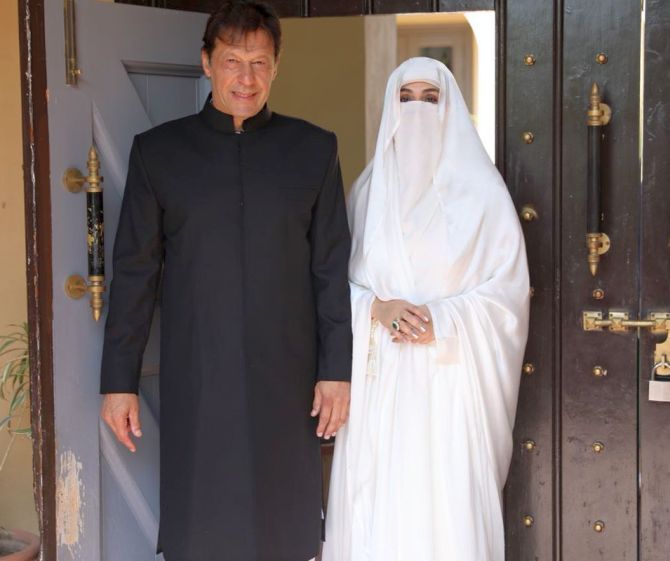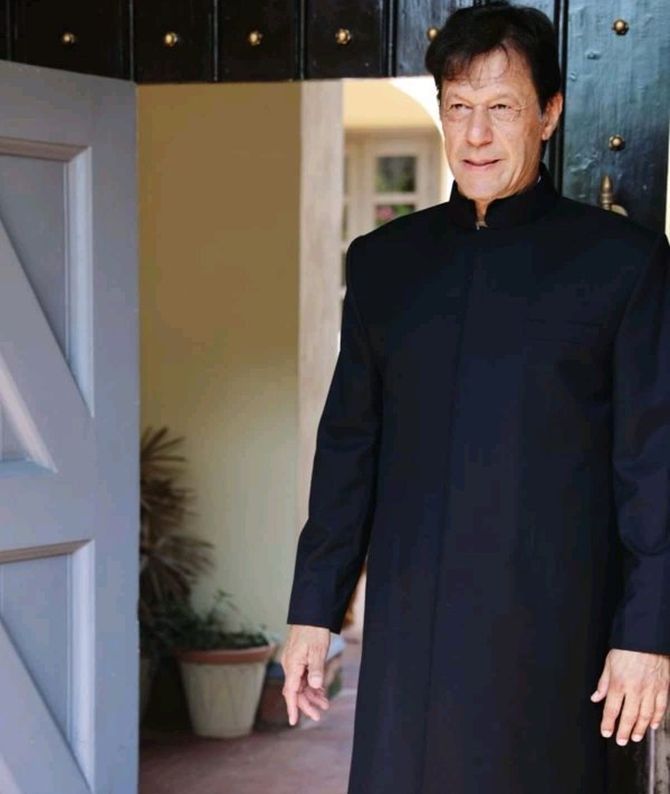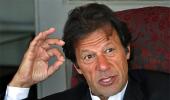Khan's government will be the third consecutive democratic government in Pakistan since 2008.

'Kaptan' Imran Khan on Saturday began a new innings as Pakistan's prime minister, assuming the reins at a time when the country was facing serious financial woes, uneasy ties with its neighbours and possible international sanctions for failing to combat terrorism.
Khan, 65, the Chairman of the Pakistan Tehreek-e-Insaf, was administered the oath of office as Pakistan's 22nd prime minister by President Mamnoon Hussain at a simple ceremony held at the Aiwan-e-Sadr (the President House) in Islamabad.
The ceremony, which was scheduled to begin at 9:30am, started 40-minute late. It commenced with the national anthem, followed by recitation of verses from the Holy Quran.
Clad in a traditional greyish black sherwani, a tearful former cricket hero was seen little nervous as he stumbled over some of the Urdu words of the oath administered to him.
Army Chief Gen Qamar Javed Bajwa, former Indian cricketer-turned-politician Navjot Singh Sidhu, diplomats and other special invitees attended the ceremony.
Wasim Akram and other members of the 1992 cricket World Cup winning team that Khan captained to victory also watched the ceremony alongside senior PTI leaders.

"A new morning is here in Pakistan with a new government which can change destiny of the country," Sidhu said, hoping that Khan's victory will be good for Pakistan-India peace process.
India's relations with Pakistan remains strained after the terror attacks by Pakistan-based groups in 2016. The sentencing of alleged Indian spy Kulbhushan Jadhav to death by a Pakistani military court in April last year has further deteriorated the bilateral ties.
Pakistan's relations with war-torn Afghanistan has also plunged over the issue of cross-border terrorism.
The United States has long been frustrated with Pakistan's overt and covert support to the Afghan Taliban and other terror groups, forcing the Trump administration to warn Islamabad and to slash military aid to the country.
Khan has assumed charge days after a delegation of the global financial watchdog Financial Action Task Force asked Pakistan to strengthen its laws and implementation against terror financing and money laundering.
The Asia Pacific Group on Money Laundering, which visited Pakistan this week, will submit a report to the Paris-based FATF which placed the country on its 'grey list' in June.
The delegation, according to media reports, has asked Pakistan to enact appropriate laws enabling local officials to act upon requests of foreign countries to freeze illegal assets and extradite those involved in terrorism financing and money laundering.
Pakistan needs to comply, by September next year, with a 10-point action plan it committed to the FATF earlier this year, to escape sanctions.

Prime Minister Khan has said that his initial focus would be on reviving Pakistan's battered economy. Pakistan's currency, the rupee, has declined significantly in the last year. Inflation is on the rise and the country's trade deficit is widening.
The new PTI government will also have to deal with a huge debt burden and dwindling foreign exchange reserves, The Express Tribune reported.
Analysts say the new government may need to turn to the International Monetary Fund for Pakistan's second bailout since 2013, which could complicate efforts to boost welfare.
Khan's oath ceremony marks the end of decades of rotating leadership between the Pakistan Muslim League-Nawaz and Pakistan Peoples Party -- the two main political parties that dominated Pakistan's political scene when the powerful military was not ruling the Muslim-majority country.
Khan's third wife Bushra Bibi was also present at the event.
Later, Khan was presented a guard of honour at the Prime Minister House.
Khan had previously announced that he would not stay at the palatial home of the prime minister.
Khan, who described Pakistan's founder Mohammad Ali Jinnah as his hero, has promised to transform corruption affected Pakistan into an Islamic Welfare state.

The Oxford-educated Pashtun on Friday defeated his only rival and Pakistan Muslim League-Nawaz chief Shahbaz Sharif in a one-sided election for the top post in the National Assembly.
Khan secured 176 votes while Sharif got 96 votes. A total of 172 votes in the 342-member lower house of parliament are needed to form a government.
In his first address to parliament, Khan had vowed to act against those who looted Pakistan.
"I promise my nation today that we will bring the tabdeeli (change) that this nation was starving for," Khan said yesterday after winning the election.
"We have to hold strict accountability in this country; the people who looted this country, I promise that I will work against them," he vowed.
The PTI emerged as the single largest party with 116 seats in July 25 elections. Its number increased to 125 after nine independent members joined it and final tally reached 158 after it was allotted 28 out of 60 seats reserved for women and five out of 10 seats reserved for minorities. He also has the support of smaller parties.
Khan's government will be the third consecutive democratic government in Pakistan since 2008 when military ruler Gen Pervez Musharraf announced elections after serving as president from 2001 to 2008 following a bloodless coup in 1999.
The PPP formed the government in 2008, followed by the PML-N led by jailed former prime minister Nawaz Sharif in 2013.
The powerful military has ruled coup-prone Pakistan for nearly half of the country's history since independence in 1947.











 © 2025
© 2025